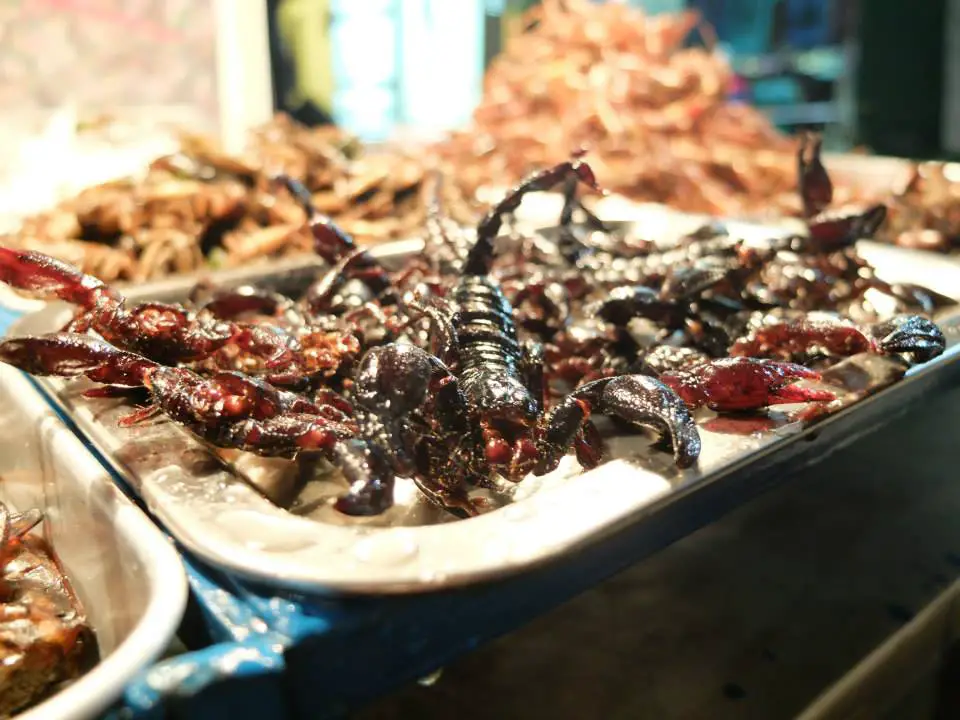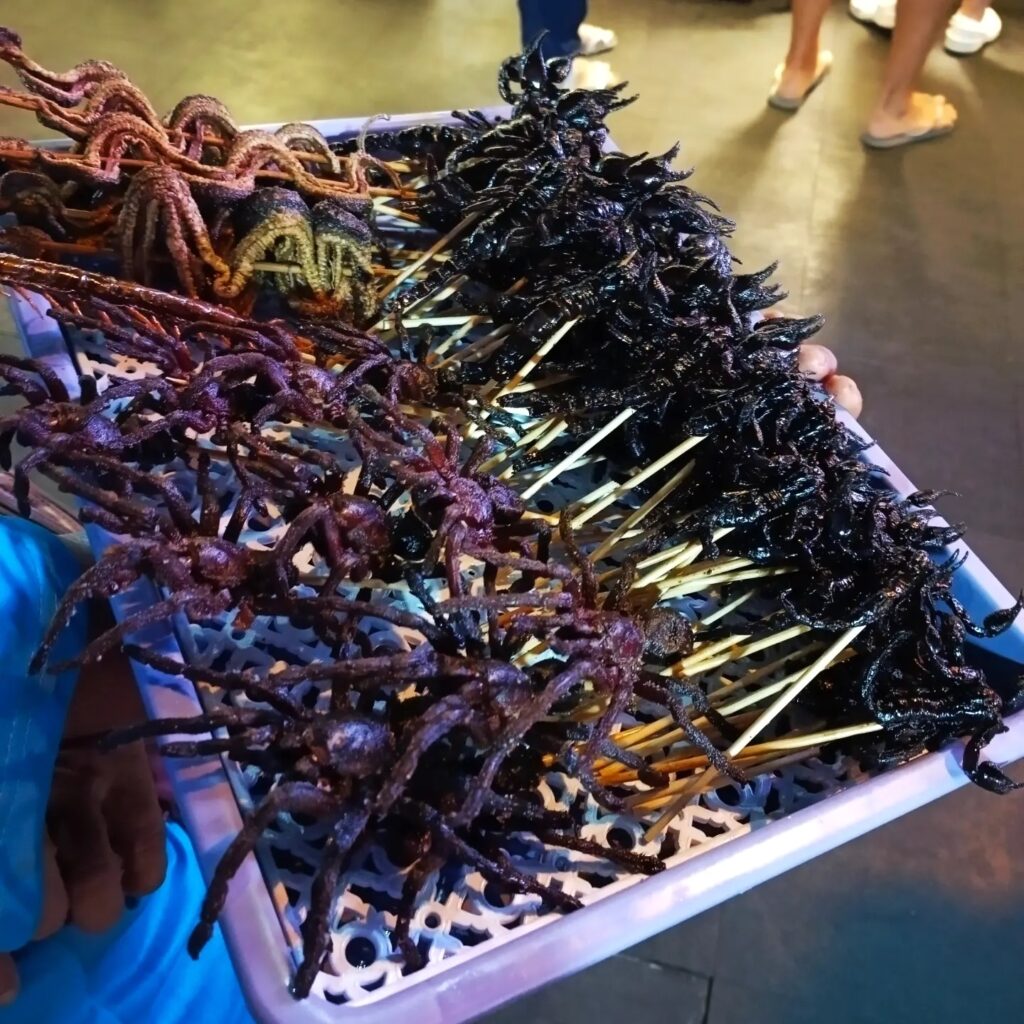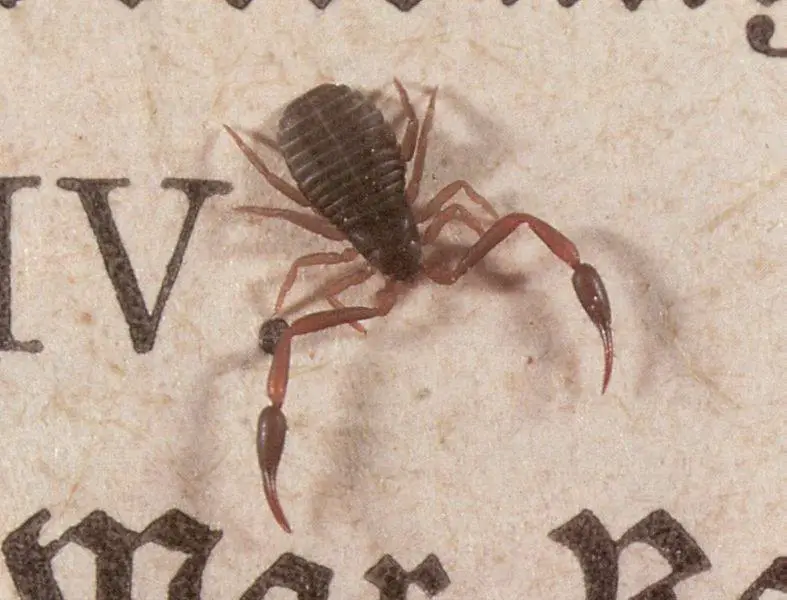Scorpions in Thailand – The ugly Truth!
Greetings, my intrepid explorers and culinary daredevils! Today, I’m taking you on a gastronomic adventure that will make your taste buds tingle with trepidation and excitement. We’re talking about the infamous, formidable, yet intriguingly edible scorpions of Thailand! So buckle up, because it’s going to be one wild ride.

Scorpions in Thailand
To start off, you might be wondering, “Are there scorpions in Thailand?” Oh, you betcha! These little critters have been calling the Land of Smiles home for much longer than Pad Thai and Tom Yum Goong have been on the menu. Scorpions skitter through Thailand’s lush landscapes and, much to the surprise (and sometimes horror) of many travelers, also end up seasoned and skewered at street food stalls.
Eating Scorpions in Thailand
Now, onto the crunch—literally. Eating scorpions in Thailand is not for the faint-hearted, nor is it for those prone to squeamish disposition. However, for the brave souls willing to walk on the wild side, scorpion snacking provides an unforgettable experience. Picture this: you’re wandering through a bustling night market, the air filled with a symphony of sizzling woks and enthusiastic chatter, when suddenly your eyes meet with a stall adorned with rows of skewered scorpions. They’re not just for show; they’re a snack! One of the most popular places for finding scorpions to eat is along Khao San Rd in Bangkok.


To eat scorpions in Bangkok is something of a traveler’s rite of passage. Truthfully, it’s more about can you stomach the experience than gourmet indulgence. Regardless, it will remain etched in your memory, a story to tell for many years to come.
Thailand Scorpion on a Stick
The iconic image of a Thailand scorpion on a stick might seem like a tourist trap, and in many ways it is. But beyond the Instagram gimmick lies a longstanding tradition of entomophagy—the practice of eating insects. With a texture that’s been likened to a crunchy jerky and a taste that…well, tastes mostly like the seasoning used, your palate might be surprised.

Is It Safe to Eat Scorpion in Thailand?
Indeed, the burning question remains: is it truly safe to eat scorpion in Thailand? Like most exotic foods, it boils down to where and what you choose to consume. Cooked properly, yes, it is safe. Street vendors typically serve these critters well-cooked, ensuring that any potential bacterial nasties are cooked away along with the venom. The prevalent Heterometrus species is notable for its fearsome appearance but relatively mild venom.

Are Scorpions in Thailand Poisonous?
“Wait,” you ask, pausing midway towards a crunchy encounter, “are scorpions in Thailand poisonous?” Most of the scorpions you’ll find ready for consumption have been detoxified – their venomous stingers removed or neutralized – making them safe for your culinary experimentation. (But always ask your vendor to make sure!)
Types of Scorpions in Thailand
Thailand is home to numerous scorpions, divided into various genera such as Heterometrus (Black/ Asian Forest Scorpions), Liocheles, Isometrus, and Chaerilus (which are more venomous). Each type has adapted to the country’s different environments, showcasing a range of sizes, colors, and venom potency. Some are more common and encountered by humans, while others remain elusive in Thailand’s wilderness.
Black Scorpions in Thailand
Among the various creepy crawlies, black scorpions in Thailand are particularly prevalent both in the wild and on the menu. Known for their daunting size and hefty pincers, they’re often the go-to choice for vendors looking to add shock value to their edible insect assortments. Commonly referred to as the Asian forest scorpion (Heterometrus spinifer). their venom is not typically lethal to humans but can still be painful.
Whip Scorpions in Thailand
Lesser-known relatives of scorpions, and not true scorpions per se, are the whip scorpions or vinegaroons. These critters have a whip-like tail and exude a vinegar-esque substance when threatened. Rest easy though, these arachnids are not on the snack list for tourists or locals alike. These guys are actually arachnids belonging to the Amblypygi family. They lack venom and possess long, whip-like appendages used for sensory purposes. These creatures are harmless to humans and may even be considered beneficial as they consume other pests.
Are Scorpions in Thailand Dangerous?

While the notion of scorpions in Thailand brings ‘danger’ to mind, the truth is, Thai scorpion dangerous encounters are quite rare. Stings can happen, particularly if you’re traipising in rural or forested areas, but these occurrences are few and far between.
Additional Sources and Safety Tips for Travelers:
- Thai National Parks Wildlife Guide: Details on wildlife, including scorpions, found within Thai national parks.
- Tourist Safety in Thailand: Official tourism site with safety advice for travelers.
- Health Precautions for Travelers: The CDC’s health recommendations for visitors to Thailand.
- Emergency Contact: In case of a scorpion sting, contact the local Thai emergency services at 1669.
When traveling in Thailand and exploring its natural landscapes, it’s wise to be mindful of the possibility of encountering scorpions, especially during nocturnal activities. Wearing protective footwear and using a flashlight at night can reduce the risk of unwanted encounters. If stung by a scorpion, seeking immediate medical attention is advisable, particularly for individuals with severe pain or signs of an allergic reaction.
Beliefs about Scorpions in Thailand
Cultural beliefs about scorpions in Thailand are mixed. They are often viewed with fear due to their venomous nature. In some Thai folklore, scorpions are symbols of protection against evil spirits. Amulets or tattoos depicting scorpions are sometimes used as talismans for this purpose. However, as with any cultural belief, perceptions vary widely among individuals.
Do Locals Eat Scorpions in Thailand?
For those pondering, “do they eat scorpions in Thailand?” I present to you the seasoned traveler’s truth: locals are typically not the ones noshing on these night-time nibbles. It’s mostly driven by tourism, with many Thais watching the spectacle much like you. Although some locals do believe it gives you a bit of extra power when it comes to engaging in bedroom activities 😉
Scorpion Hunting: Tips and Tricks
Identifying Scorpion Nests
When it comes to identifying scorpion nests, it’s important to keep a keen eye out for certain signs. Look for areas that provide shelter and protection, such as cracks in walls, under rocks, or in dark corners. Scorpions are nocturnal creatures, so they prefer hiding in cool and damp places during the day. Another clue to look for is the presence of shed exoskeletons, as scorpions molt as they grow. These discarded exoskeletons can indicate the presence of a nest nearby. Remember, scorpions are skilled at camouflage, so be patient and observant when searching for their nests.
Best Time and Places for Scorpion Hunting
When it comes to scorpion hunting, timing and location are key. While scorpions can be found in various habitats throughout Thailand, there are certain times and places that offer better chances of spotting these fascinating creatures. Nighttime is the most optimal time for scorpion hunting, as they are nocturnal creatures and are more active during the dark hours. Additionally, scorpions are often found in dry and rocky areas, such as deserts, grasslands, and rocky outcrops. These environments provide them with the ideal conditions to thrive. If you’re looking to maximize your scorpion hunting experience, consider visiting national parks or nature reserves that have a diverse range of habitats. These areas are more likely to have a higher concentration of scorpions. Remember to bring a UV flashlight to help you spot scorpions, as their exoskeletons fluoresce under ultraviolet light. Happy hunting!
Essential Equipment for Scorpion Hunting
When it comes to scorpion hunting, having the right equipment is essential for a successful and safe experience. Here are some items that every scorpion hunter should have in their arsenal:
- UV flashlight: Scorpions fluoresce under ultraviolet light, making a UV flashlight a crucial tool for locating them in the dark.
- Tongs: Long-handled tongs are useful for capturing scorpions without getting too close.
- Glass jar: A glass jar with a secure lid is perfect for temporarily housing captured scorpions.
- Gloves: Sturdy gloves protect your hands from potential stings.
Remember, safety should always be your top priority when scorpion hunting. Be sure to wear protective clothing, use caution when handling scorpions, and follow local regulations and guidelines. Happy hunting!
Safety Precautions: Dealing with Venomous Scorpions
When it comes to dealing with venomous scorpions, it’s important to prioritize safety and take the necessary precautions. Here are some tips to keep in mind:
- Avoid direct contact: It’s best to avoid touching or handling venomous scorpions, as they can deliver a painful sting. Maintain a safe distance and observe them from a distance.
- Protective clothing: When venturing into scorpion habitats, wear protective clothing such as long sleeves, pants, and closed-toe shoes to minimize the risk of getting stung.
- Use a flashlight: Scorpions are nocturnal creatures, so use a flashlight to illuminate your surroundings and spot them more easily.
- Be cautious when lifting objects: Scorpions often hide in dark and secluded places, such as under rocks or logs. Exercise caution when lifting objects to avoid disturbing them.
- Know the signs of a sting: Familiarize yourself with the symptoms of a scorpion sting, such as intense pain, swelling, and numbness. Seek medical attention if you experience severe symptoms.
Remember, prevention is key when it comes to dealing with venomous scorpions. By following these safety precautions, you can minimize the risk of getting stung and ensure a safe scorpion encounter.
Scorpion Hunting Etiquette: Do’s and Don’ts
When engaging in scorpion hunting, it is important to follow proper etiquette to ensure a safe and enjoyable experience. Here are some tips to keep in mind:
- Respect the scorpion’s habitat and do not disturb their nests.
- Choose the best time and places for scorpion hunting, as they are most active at night.
- Make sure to have the essential equipment, such as a UV flashlight and sturdy gloves.
- Safety should be a priority, especially when dealing with venomous scorpions. Always exercise caution and avoid unnecessary risks.
Remember, scorpion hunting can be an exciting adventure, but it is crucial to be responsible and respectful towards these fascinating creatures.
Scorpion Stings: First Aid and Treatment
Recognizing Scorpion Stings
When it comes to recognizing scorpion stings, there are a few key symptoms to look out for. Pain, which can be intense, is often the first sign of a scorpion sting. You may also experience numbness and tingling at the site of the sting. It’s important to note that scorpion stings can vary in severity depending on the species of scorpion and individual reactions. If you suspect you’ve been stung by a scorpion, it’s crucial to take immediate action to minimize the effects of the venom.
Here are some steps you can take after a scorpion sting:
- Remove the stinger, if present, without squeezing or using tweezers. Scrape it off gently with your fingernail, a credit card, or a blunt knife to avoid injecting more venom.
- Wash the wound thoroughly with soap and water to prevent infection.
- Ease swelling and pain by applying ice or a cold compress to the affected area.
- Take over-the-counter pain relievers like ibuprofen or acetaminophen to alleviate discomfort.
- Reduce itching and inflammation by applying topical creams or ointments, such as hydrocortisone or antihistamines.
Remember, if you experience severe symptoms such as difficulty breathing, chest pain, swelling, nausea, vomiting, or other concerning signs, seek immediate medical attention.
Immediate Steps to Take After a Scorpion Sting
Scorpion stings can be painful and potentially dangerous. If you are stung by a scorpion, it’s important to take immediate action to minimize the effects of the venom. Here are some steps you can take:
- Remove the stinger: If the scorpion’s stinger is still embedded in your skin, gently scrape it off with your fingernail, a credit card, or a blunt knife. Avoid squeezing or using tweezers, as this can inject more venom.
- Clean the wound: Wash the sting site thoroughly with soap and water to prevent infection.
- Reduce swelling and pain: Apply ice or a cold compress to the affected area to ease swelling and pain.
- Take pain relievers: Over-the-counter pain relievers like ibuprofen or acetaminophen can help alleviate discomfort.
- Manage itching and inflammation: Use topical creams or ointments, such as hydrocortisone or antihistamines, to reduce itching and inflammation.
If you experience severe symptoms such as difficulty breathing, chest pain, swelling, nausea, vomiting, dizziness, or fainting, seek immediate medical attention. These could be signs of an allergic reaction or a life-threatening condition. Remember to consult your doctor if you have any medical conditions or allergies that may affect your response to a scorpion sting.
First Aid for Scorpion Stings: What Works and What Doesn’t
When it comes to treating scorpion stings, there are several steps you can take to alleviate discomfort and promote healing. Remove the stinger, if present, without squeezing or using tweezers. Scrape it off gently with your fingernail, a credit card, or a blunt knife to avoid injecting more venom. Wash the wound thoroughly with soap and water to prevent infection. Ease swelling and pain by applying ice or a cold compress to the affected area. Take over-the-counter pain relievers like ibuprofen or acetaminophen to alleviate discomfort. Reduce itching and inflammation by applying topical creams or ointments, such as hydrocortisone or antihistamines. Remember, if you experience severe symptoms such as difficulty breathing or chest pain, it’s important to seek immediate medical attention.
When to Seek Medical Attention for Scorpion Stings
If you experience severe symptoms such as difficulty breathing, chest pain, swelling, nausea, vomiting, dizziness, or fainting, it is crucial to seek immediate medical attention. These could indicate an allergic reaction or life-threatening venom-induced anaphylaxis. It is also recommended to consult your doctor if you have any medical conditions or allergies that may affect your response to scorpion stings. They may advise carrying an epinephrine auto-injector (EpiPen) or prescribe antihistamines or steroids to prevent or treat severe reactions.
Conclusion
Remember, whether you’re munching on scorpions or simply sipping a Singha by the beach, Thailand’s got an adventure for everyone. Just be sure to bring your bravest appetite and an open mind, and who knows? You might just find your next favorite snack in the most unexpected places. Bon appétit, or as the Thais say, “Gin hai aroy!”

